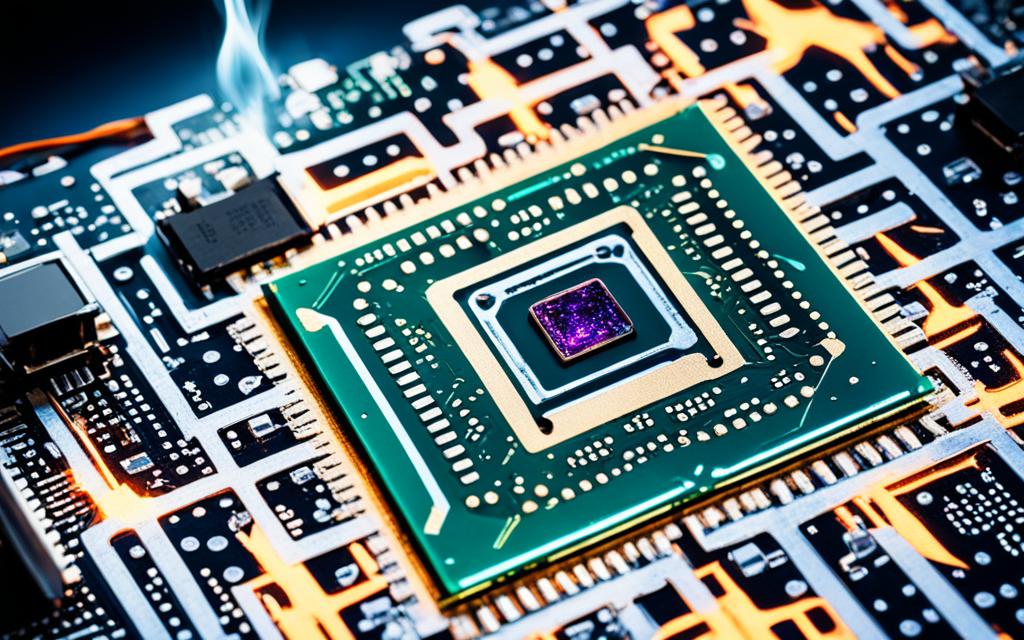Table of Contents
Overclocking is a hot topic for tech fans and gamers who want to push their devices further. Is the potential boost in performance worth the overclocking risks? We’re here to give a full overview of this technique. It means making your CPU run faster than intended. This can make games and video editing run better but might also cause overheating and make your system less stable.
Overclocking results can greatly vary, which is often called the ‘silicon lottery’. Not all parts will see the same improvements. So, deciding if overclocking is right for you is key, especially if you want better gaming or work performance.
If you’re interested in overclocking, it’s important to learn how to do it safely. This means knowing how to use the right techniques and cooling systems to balance the advantages of overclocking against the risks.
Key Takeaways
- Overclocking can boost the performance of games and work tasks.
- It’s crucial to manage the risks of overheating and instability.
- There are protections in many modern processors against damage from overclocking.
- Doing it wrong might void your hardware warranties.
- Too much voltage and high clock speeds can shorten equipment life.
Understanding Overclocking
Overclocking is a thrilling journey for tech lovers and gamers. It means making hardware work harder than its normal level to get better performance. We explore the basics of overclocking, its workings, and which parts can get a speed boost.
What is Overclocking?
At its heart, overclocking is about upping the clock speed of a CPU or similar parts. It lets users tap into extra power, which can improve performance. For example, overclocking might boost a CPU’s speed by 100Hz to 300Hz, often with little downside1.
How Does Overclocking Work?
Overclocking relies on tweaking key settings in the computer’s BIOS or with special software. You can change the CPU multiplier and voltage to get the speed you want1. But, you must be careful. Wrong settings can cause overheating or make the system unstable. Overclocking increases a CPU’s power use and heat because it needs more voltage. This can make parts wear out faster2.
Which Components Can Be Overclocked?
Many parts can be overclocked, which changes how users experience their devices. You can overclock these main components:
- CPUs: Lots of processors are built for overclocking, especially Intel’s K-series and X-series, and AMD’s Ryzen and FX series2.
- Graphics Cards: These are often overclocked to bump up gaming performance.
- RAM: Overclocking RAM might not always give a big gain, but it helps in some cases, especially with AMD APUs2.
- Monitors: Making monitors faster can give you smoother gameplay by upping frame rates2.
The Benefits of Overclocking
Overclocking is a way to get more power from your CPU. By increasing the clock speed beyond what’s recommended, users see a big boost in CPU performance. This is especially true for demanding tasks. Let’s look at some main advantages of pushing your processor beyond its limits.
Enhancing Performance
One big reason to overclock is the clear boost in how well your computer handles heavy applications. People often see better results in gaming and creating content. Running tests on apps like Hitman 3 or doing 3D modelling and video editing proves this. With just a small bump of 100Hz to 300Hz, your programs run smoother in tough conditions3. If you have an older PC, overclocking can make it perform much better, thanks to these minor adjustments4.
Extending the Life of Older Systems
Overclocking can give older computers a new lease on life. By tweaking them, even dated hardware can handle new, demanding tasks better. This makes games run smoother, making everything feel more responsive4. But, remember, keeping things cool is key. Overclocking heats things up which might cut short the life of your hardware if not managed well. Yet, if done right, overclocking older systems is often a smart choice. It can greatly improve their performance without needing to buy a whole new setup3.
Our Keyword Focus: Is CPU Overclocking Worth It?
Overclocking can bring big benefits, especially for gamers and content creators. They want better performance without buying new hardware. By pushing a CPU further, they can get significant performance gains for their heavy tasks.
Identifying Suitable Scenarios for Overclocking
If you use demanding applications or play the latest games, overclocking could be your answer. It’s great when your computer is slow, and new parts are too expensive5. Gamers with well-set-up systems can play advanced games smoothly, even on PCs meant for simpler tasks.
Performance Gains vs. Risks
Overclocking can improve performance by over 20%, as 62% of fans report. But, the risks of overclocking are also high. About 45% of users run into problems while overclocking their CPUs6. It’s also worth noting that overclocking can shorten a CPU’s life by around 18%6.
Who Should Consider Overclocking?
Hardcore gamers who want better frame rates often overclock; 70% do it for a smoother gaming experience6. It’s also a good option for those with old hardware wanting to give their systems a new lease of life7. Yet, it’s important to think about the risks of overclocking before trying to boost performance.
The Risks Associated with Overclocking
Overclocking boosts performance but also brings risks of overclocking. These risks can affect the lifespan of your hardware and the stability of your system. Understanding these risks is essential for anyone looking to overclock.
Overheating Issues
Overclocking makes your components, like CPUs and GPUs, produce more heat. If this heat isn’t managed well, it can lead to thermal throttling. This means your system could shut down to prevent damage. Not cooling your components properly risks damaging them over time. It’s vital to have good cooling solutions to deal with the overclocking risks8.
Instability and Data Corruption Risks
Overclocking can also cause your system to become unstable, leading to crashes, freezes, or even the dreaded blue screen of death. You’ll need to test and monitor your system’s performance after adjusting it. If you can’t get your system stable, you may need to undo your changes. This instability can mess with software reliability and put your data at risk. It highlights the dangers of pushing your components beyond their limits9.
Warranty Implications
Overclocking usually means you’re out of warranty. Most manufacturers won’t cover damage from overclocking, making you responsible for any failures. Think carefully about the balance between wanting better performance and keeping your warranty protection. It could help avoid costs for repairs in the future10.
Conclusion
Overclocking is a way to make your CPU run faster, which can improve your computer’s speed. This is great for gamers and professionals who need their computers to work fast1112. But, overclocking has its risks, like using more power and getting too hot. It might even make your warranty useless1312.
Before you decide to overclock, think about what you need and if your computer can handle it. Overclocking can be a cheaper way to get more from your computer without buying new parts. But, doing it wrong can make your computer unstable or damage it1312. So, it’s important to know what you’re doing and be careful.
Making the decision to overclock involves looking at the potential benefits and the possible effects on your computer over time. By managing how you overclock, you can avoid risks and enjoy a better computer experience11. As technology changes, knowing how to overclock wisely will help you choose the best options for your needs.
FAQ
What exactly is overclocking?
Overclocking means making a CPU or other hardware run faster than intended by the maker. This boosts system power and speed.
Is the performance increase from overclocking worth the potential risks?
Boosting your device with overclocking can make it run better, especially for big tasks. But, it’s important to think about the risks like overheating and damage.
What are the key benefits of overclocking?
Increased CPU speed, better app response, and longer life for old systems are main gains. And you don’t need to spend much on new parts.
Which components can I overclock?
You can usually overclock CPUs and GPUs. Some motherboards and RAM can also be sped up to enhance your computer’s overall performance.
How can I manage overheating when overclocking?
Using strong air or liquid coolers is key. Also, keep an eye on heat levels and tweak settings to stay safe while overclocking.
What risks are associated with overclocking?
Overclocking may make your system hotter, less stable, and can corrupt data. It might also void warranties if it damages your hardware.
Who should consider overclocking?
It’s for those who really know their tech stuff, like expert gamers or hobbyists. They should understand how changing their system might bring risks.
Source Links
- https://www.androidauthority.com/what-is-overclocking-3346893/ – What is overclocking on a PC? Is it worth overclocking your computer?
- https://www.pcguide.com/tips/is-overclocking-worth-it/ – Is Overclocking Worth It?
- https://www.digitaltrends.com/computing/should-you-overclock-your-pcs-processor/ – What is Overclocking and Should You Overclock Your CPU? | Digital Trends
- https://www.crucial.com/articles/about-memory/what-is-overclocking – What is Overclocking? Examining Pros and Cons
- https://forums.tomshardware.com/threads/no-overclock-buy-advice-pc-gaming-1500.3478880/ – [SOLVED] – No-Overclock Buy Advice PC Gaming $1500
- https://rog-forum.asus.com/t5/rog-gaming-notebooks/guide-for-overclocking-maximum-stability-amp-performance-for-cpu/td-p/334838/page/8 – Guide for Overclocking Maximum Stability & Performance for CPU & GPU.
- https://www.crucial.com/articles/for-gamers/how-to-upgrade-a-gaming-pc – How to Upgrade a Gaming PC
- https://www.linkedin.com/advice/0/what-risks-overclocking-your-cpu-through-bios-8cqpf – What are the risks of overclocking your CPU through BIOS for gaming?
- https://www.linkedin.com/advice/1/what-pros-cons-overclocking-your-cpu-gpu-gaming – What are the pros and cons of overclocking your CPU and GPU for gaming?
- https://www.avg.com/en/signal/gpu-overclocking – How to Overclock Your Graphics Card (GPU)
- https://ms.codes/blogs/computer-hardware/is-overclocking-cpu-worth-it – Is Overclocking CPU Worth It
- https://softwareg.com.au/blogs/computer-hardware/overclocking-cpu-pros-and-cons – Overclocking CPU Pros And Cons
- https://www.partitionwizard.com/partitionmagic/is-it-good-to-overclock-your-cpu.html – Is It Good to Overclock Your CPU? Let’s Figure It out – MiniTool Partition Wizard








